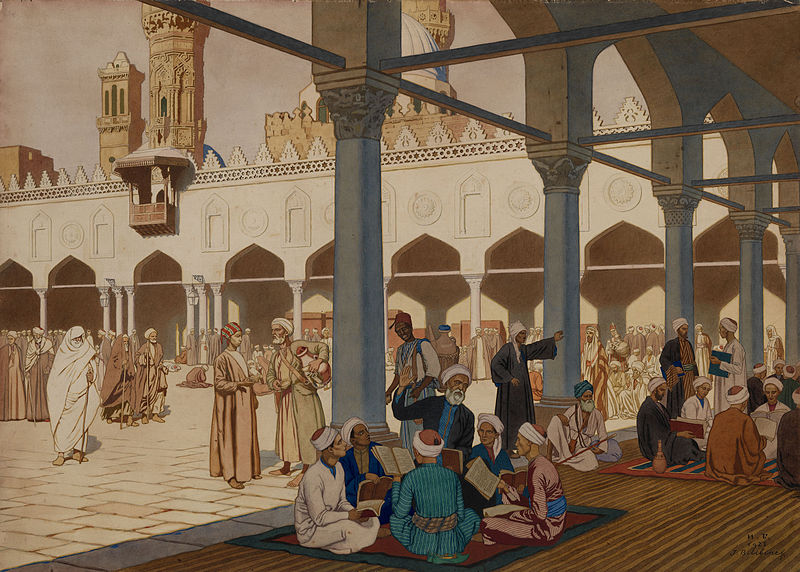I have been studying history all my life. It has always been a passion of mine and one of my favorite subjects. However, as a history teacher at a university, I noticed that my students don’t always share my passion for history. Often they are baffled, puzzled and horrified by the events of history. Some even lose faith in their religion when they study the histories of related empire.
There are three main reasons why this happens, and I will explain all three in this article. My hope is that by the end of this article, you will be able to study any part of history without it shaking your faith in the least.
The misnomer of Islamic History
The first major problem for Muslim students, in particular, is that the history of the Muslim Empires is often labeled Islamic History. This mislabelling of events creates unrealistic expectations in the mind of the student, as they assume whatever they are going to study represents the religion of Islam. They also may take this history as a source of Islamic legislation as it is labeled as Islamic.
The label itself is a problem. Classically, Muslim scholars divided history into two subjects, known in Arabic as Sīrah and Taʾrīk̲h̲. Sīrah focused on the life of the Prophet Muḥammad (peace be upon him) only. His life would be studied religiously, and various lessons extracted from it upon which the foundations of the religion were built.
Any book focusing on events after his time is called a Taʾrīk̲h̲ book. Generally, these books narrated all historical events for that time period without comment or judgment.
If we had to invent similar labels in English for these two
parts of history, then we can say that the life of Prophet Muḥammad (peace be
upon him) is Islamic History, and whatever came after his time is Muslim
History. The difference is very important.
The life of Prophet Muḥammad (peace be upon him) represents Islam at its best. His life is to be studied in detail, analyzed for lessons, taken as a proof of the truthfulness of his message, and used as a basis for forming our understanding of Islam. It is truly Islamic History is that his actions were guided by revelation and represent the perfect role model of Islam for the world.
Anything that occurred after his life is actually Muslim History. It is the history of people who believe in Islam but are subject to human temptation, corruption, and error. They may at times accomplish amazing things in the name of Islam. And they may at times fall to the deepest of lows due to temptation or human error. Their lives do not represent Islam. Rather their lives represent the struggles, highs, and lows of the average Muslim.
Just as the Muslim world today is full of sinners, saints and
everything in between. So was the case in every century of Muslim history. The
difference being that the sinners and saints often made it into the history
books, while everybody else was left out. This is because the life of the
average person is probably too boring to write a history book about, but the
life of a tyrant king or a saintly king is the topic of a bestseller.
If we approach the life of an individual after the time of the Prophet (peace be upon him) as Muslim History, this will lower our expectations and help us appreciate history better. We will be able to appreciate their struggles, understand their errors, and marvel at their accomplishments because this is the history of Muslims.
The Human Aspect of History
Continuing on the topic of Muslim History, the second issue
that people often overlook is just how human Muslims throughout history have
been.
Many Muslims approach history with the misconception that we
are living at the worst point in history, and that every era before us was full
of saintly Muslims representing the religion properly.
Reality is that every generation of Muslims had their saints, sinners and everything in between. The average Muslim general, king, merchant, and governor were just that; average.
They weren’t all saints. Their lives were a complex mix of good deeds, sins, and permissible deeds. They experienced highs and lows, moments of greatness and moments of weakness. They passed some tests of life and failed others. So it is perfectly normal to study the life of any individual in history and learn that he at some points in his life was a righteous worshipper, while at some other point murdered his enemies. This is because of the complexity of human life, and especially leadership and governance which often forces people to make extremely difficult decisions between life and death.
The correct approach to studying the life of anybody after the time of the Prophet (peace be upon him) is to accept their humanity. The first generation of Muslims was the best, but they were still human and still erred. Each generation after that fell into different types of sins and mistakes. Just as we do today.
When you realize that every historical figure was struggling with desires and temptation just as we do, you become more understanding of their mistakes, and you approach history with more realistic expectations.
Different Times, Different Norms
The final thing that confuses people when studying history is
that there are some fundamental differences between the cultures we live in and
that of the ancient world.
A lot of young people have not been exposed to anything outside
the modern culture and they assume that that is the way the world always was.
As a result, when they study history they are shocked to find things that
contradict their norms and it shakes their faith.
We live in a time that is very unique to human history. We live
in the only century in human history without child marriages, slavery, or
military expansion of empires. These things are foreign concepts to our times
and many people wrongly assume that people always considered these things
immoral or wrong.
Reality is that the bulk of human history, including almost all major cultures, civilizations, and religions, had no problem with any of these. Slavery, child marriages, and military expansion were global norms in the ancient world. This is simply a reality. As soon as we accept these as historical realities, then history makes a lot more sense. We must approach history with this understanding in order to understand it in its proper context.
Conclusion
If we accept this reality, then history makes a lot more sense. We shouldn’t be surprised by any of these concepts when we find them in the history of any civilization, because these were the norms of that time. To judge ancient cultures and civilizations by 21st-century norms is illogical and unfair. Historical incidents should be understood within the context of the places and times they took place in. If history is studied in light of these three facts, it becomes much easier to understand and interact with. We should not expect perfection from the people of the past, present or future. We should not project our cultural norms onto past civilizations. And we should not judge Islam by the actions of Muslims. Because Islam is the revelation from God, but Muslims are humans who struggle to follow that revelation to various degrees. Keep these three points in mind whenever studying any aspect of Muslim History.
To learn more about Muslim History, sign up for our online course Muslim Golden Ages: Rise & Fall today – limited seats available.









